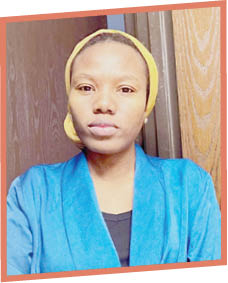‘As a young professional, you must invest in continuous learning’
Pharm. Maryam Imam, a distinguished healthcare professional and researcher with over seven years of expertise in pharmacy practice, public health, and clinical research holds a Bachelor of Pharmacy degree from Ahmadu Bello University (ABU), and a Master’s in Health Economics from Bayero University Kano, BUK. She is currently a Ph.D. candidate in Public and Community […]

Pharm. Maryam Imam, a distinguished healthcare professional and researcher with over seven years of expertise in pharmacy practice, public health, and clinical research holds a Bachelor of Pharmacy degree from Ahmadu Bello University (ABU), and a Master’s in Health Economics from Bayero University Kano, BUK. She is currently a Ph.D. candidate in Public and Community Health at the Medical College of Wisconsin.
Her work bridges the fields of pharmacy, public health, and health economics to generate real-world evidence aimed at addressing health disparity and improving access to healthcare and pharmaceuticals.
In this interview, Pharm. Maryam shares the inspiration behind her work and her unwavering commitment to advancing equitable healthcare and pharmaceutical accessibility.
What informed your choice of pharmacy and specialisation in public health and health economics?
Thank you for having me. My journey began with a deep desire to make a meaningful impact on people’s lives. Growing up in Nigeria, I witnessed first-hand the challenges individuals faced in accessing basic healthcare and medications. This motivated me to study pharmacy at Ahmadu Bello University, to gain the skills needed to address these gaps. Over time, I realized that solving healthcare challenges required not just clinical expertise but also systemic solutions. This led me to pursue a master’s in health economics at Bayero University Kano and later a Ph.D. in Public and Community Health. These disciplines allow me to analyze systemic issues and develop data-driven interventions to bridge gaps in pharmaceutical access and equity.
- Why it’s unfair for North to reclaim presidency in 2027 – Okupe
- APC, PDP clash in Kwara over gov’s budget presentation
You’ve built an impressive career, including co-founding MJay Pharmaceutical Ltd. Can you tell us about the inspiration behind this initiative and its impact so far?
MJay Pharmaceutical Ltd was borne out of a need I identified during my clinical practice and experiences—supply chain inefficiencies and affordability challenges that hindered access to essential medications. We envisioned an enterprise that not only improves access to essential pharmaceuticals but also contributes to building resilient healthcare systems in areas where it is most needed. Our goal is to enhance accessibility while maintaining quality and affordability, ultimately addressing health disparities sustainably.
Your research focuses on generating real-world evidence to address health disparities in sickle cell disease, SCD, and other disease conditions. Why this focus?
SCD is a condition that disproportionately affects populations of African descent, including my home country, Nigeria, where the burden is particularly high. In the United States, about 100,000 individuals live with SCD, and the condition predominantly impacts African American and Hispanic communities. Despite this prevalence, it remains underfunded and under-researched. A part of my PhD work and my work in this field is driven by a commitment to equity—ensuring that individuals with SCD have access to life-saving therapies, regardless of their socioeconomic status or location. My research incorporates real-world data to understand barriers, improve care delivery, and advocate for policy changes that prioritize the needs of this population.
Beyond research, you’ve also worked extensively on disease management programs and community outreach. How do these experiences inform your work?
My clinical and community outreach experiences have been transformative. Engaging directly with patients through disease management programs has shown me the practical challenges they face, from medication adherence to navigating complex healthcare systems.
Through community outreach, I have been able to connect with underserved populations, ensuring that my work and interventions are grounded in their realities. These experiences remind me that while data and policy are essential, the human element must always remain central to healthcare. These also fueled my passion for pursuing a Ph.D. in Public and Community Health, as I sought to deepen my ability to create meaningful, evidence-based solutions for healthcare.
I recently came across one of your articles where you discussed SCD and advancements like gene therapy. Can you tell us more about the inspiration behind that piece and its relevance to your work?
Thank you for mentioning that article. Writing that article was an opportunity to highlight both the challenges and the hope for SCD. Gene therapy holds immense promise as it offers the potential for a cure for SCD rather than just symptom management. However, challenges such as affordability, accessibility, and equitable distribution persist. The inspiration behind that article stemmed from my desire to bridge the gap between scientific advancements and their practical implications irrespective of socioeconomic background or location. My research aligns with this by focusing on real-world evidence to address the disparity in care and improve pharmaceutical accessibility.
You’ve also played significant roles in leadership and how does this align with your mission?
Leadership has been integral to my journey. Whether through my roles as Vice President and Treasurer of the Pharmaceutical Association of Nigerian Students (PANS) or in various community health initiatives, leadership has provided me with the opportunity to advocate for change and inspire others to act. This directly aligns with my mission to improve healthcare accessibility and outcomes.
What are the biggest challenges you’ve faced in your career, and how have you overcome them?
One major challenge has been addressing systemic barriers to healthcare, which can often feel overwhelming. However, I approach these challenges by focusing on collaboration and data-driven strategies.
What advice would you give to young professionals aspiring to make an impact in healthcare?
My advice would be to remain curious, compassionate, and committed. Understand the communities you wish to serve, invest in continuous learning, and build strong networks. Most importantly, never underestimate the power of passion and perseverance. Small actions, when sustained, lead to significant change.
